

Faith and rationality. Faith and rationality are two ideologies that exist in varying degrees of conflict or compatibility.
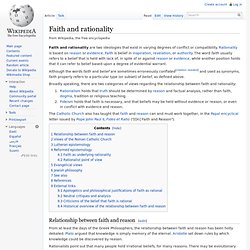
Rationality is based on reason or evidence. Faith is belief in inspiration, revelation, or authority. The word faith usually refers to a belief that is held with lack of, in spite of or against reason or evidence, while another position holds that it can refer to belief based upon a degree of evidential warrant. Although the words faith and belief are sometimes erroneously conflated[citation needed] and used as synonyms, faith properly refers to a particular type (or subset) of belief, as defined above. Broadly speaking, there are two categories of views regarding the relationship between faith and rationality: Rationalism holds that truth should be determined by reason and factual analysis, rather than faith, dogma, tradition or religious teaching.Fideism holds that faith is necessary, and that beliefs may be held without evidence or reason, or even in conflict with evidence and reason.
Technologies of the Self. When I began to study the rules, duties, and prohibitions of sexuality, the interdictions and restrictions associated with it, I was concerned not simply with the acts that were permitted and forbidden but with the feelings represented, the thoughts, the desires one might experience, the drives to seek within the self any hidden feeling, any movement of the soul, any desire disguised under illusory forms.
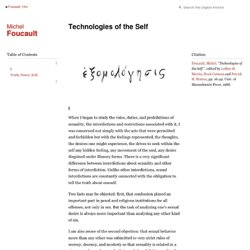
There is a very significant difference between interdictions about sexuality and other forms of interdiction. Unlike other interdictions, sexual interdictions are constantly connected with the obligation to tell the truth about oneself. Two facts may be objected: first, that confession played an important part in penal and religious institutions for all offenses, not only in sex. But the task of analyzing one's sexual desire is always more important than analyzing any other kind of sin. Posthuman Destinies » Michel Foucault: The Culture of the Self Lecture at Berkeley. These are the classic lectures on Care of the Self given in Berkeley CA April 12/13 1983 that traces the history of the cultivation of Self-Knowledge and Soul-Making within the Western (Greco-Roman) tradition.
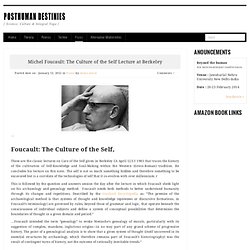
He concludes his lecture on this note:. The self is not so much something hidden and therefore something to be excavated but is a correlate of the technologies of self that it co-evolves with over millennium. r This is followed by the question and answers session the day after the lecture in which Foucault sheds light on his archaeology and genealogy method. Foucault needs both methods to better understand humanity through its changes and repetitions.
Interpersonal emotion regulation. Interpersonal emotion regulation refers to the process of trying to influence the way another person or persons feel.
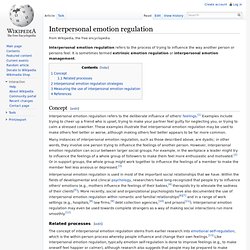
It is sometimes termed extrinsic emotion regulation or interpersonal emotion management. Concept[edit] Interpersonal emotion regulation refers to the deliberate influence of others' feelings.[1] Examples include trying to cheer up a friend who is upset, trying to make your partner feel guilty for neglecting you, or trying to calm a stressed coworker. These examples illustrate that interpersonal emotion regulation may be used to make others feel better or worse, although making others feel better appears to be far more common. Many instances of interpersonal emotion regulation, such as those described above, are dyadic; in other words, they involve one person trying to influence the feelings of another person.
Social sharing of emotions. A young girl shares a pleasant emotional experience with her mother The social sharing of emotions is a phenomenon in the field of psychology that concerns the tendency to recount and share emotional experiences with others.
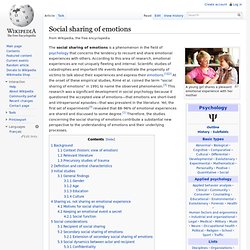
According to this area of research, emotional experiences are not uniquely fleeting and internal. Scientific studies of catastrophes and important life events demonstrate the propensity of victims to talk about their experiences and express their emotions.[1][2] At the onset of these empirical studies, Rimé et al. coined the term “social sharing of emotions” in 1991 to name the observed phenomenon.[3] This research was a significant development in social psychology because it questioned the accepted view of emotions—that emotions are short-lived and intrapersonal episodes—that was prevalent in the literature. Background[edit] Context (historic view of emotion)[edit] Relevant literature[edit] Precursory studies of trauma[edit] Definition and central characteristics[edit]
Spl.stanford.edu/pdfs/1998 Review of General Psychology - Emerging Field of Emo. Reg..pdf. Boundary 2, Vol. 18, No. 1 (Spring, 1991), pp. 83-103. Www.college.columbia.edu/core/sites/core/files/text/Michel Foucault What is Enlightenment.pdf. Wp/wp-content/uploads/2011/12/Foucault-Hermeneutics-Jan-6.pdf. Www.unisa.edu.au/Documents/EASS/HRI/foucault-conference/lambevski.pdf. Michel Foucault. 1.

Biographical Sketch Foucault was born in Poitiers, France, on October 15, 1926. His student years seem to have been psychologically tormented but were intellectually brilliant. Genealogy of Morals: Third Essay, Sections 15-22. Summary Having perceived that the spiritually healthy cannot look after the sick without becoming sick themselves, Nietzsche concludes that the sick need "doctors and nurses who are themselves sick.

" The role of the ascetic priest is precisely to tend the sick masses. He must be sick himself, but also strong enough to lead and dominate the masses. The ressentiment of the masses demands that they find someone to blame for their suffering, and this search for a scapegoat can be violent and dangerous. Friedrich Nietzsche. First published Fri May 30, 1997; substantive revision Fri Apr 29, 2011 Friedrich Nietzsche (1844–1900) was a German philosopher of the late 19th century who challenged the foundations of Christianity and traditional morality.
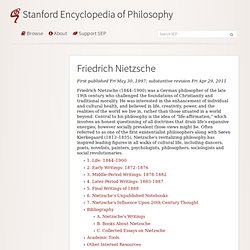
He was interested in the enhancement of individual and cultural health, and believed in life, creativity, power, and the realities of the world we live in, rather than those situated in a world beyond. Central to his philosophy is the idea of “life-affirmation,” which involves an honest questioning of all doctrines that drain life's expansive energies, however socially prevalent those views might be.
Often referred to as one of the first existentialist philosophers along with Søren Kierkegaard (1813–1855), Nietzsche's revitalizing philosophy has inspired leading figures in all walks of cultural life, including dancers, poets, novelists, painters, psychologists, philosophers, sociologists and social revolutionaries. 830/art%253A10.1023%252FA%253A1011930128829.pdf?auth66=1388029155_c790c4e66f69b9f9e2b9da76ae93b38a. 539/art%253A10.1007%252Fs00127-006-0051-5.pdf?auth66=1388028557_141c0ed422e2735fe8ab2aa0916b19f9.
Www.ncbi.nlm.nih.gov/pmc/articles/PMC3455910/pdf/11524_2006_Article_44.pdf. Michel Foucault, “Friendship as a Way of Life” “Friendship as a Way of Life” Michel Foucault R. de Ceccaty, J.
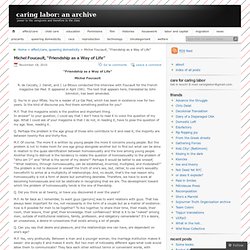
Danet, and J. Le Bitoux conducted this interview with Foucault for the French magazine Gai Pied. It appeared in April 1981. Commodity fetishism. Commodity fetishism: In the marketplace, producers and consumers perceive each other by means of the money and goods that they exchange.
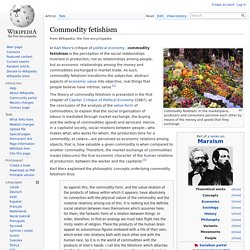
In Karl Marx's critique of political economy , commodity fetishism is the perception of the social relationships involved in production, not as relationships among people, but as economic relationships among the money and commodities exchanged in market trade. As such, commodity fetishism transforms the subjective, abstract aspects of economic value into objective, real things that people believe have intrinsic value.[1] The theory of commodity fetishism is presented in the first chapter of Capital: Critique of Political Economy (1867), at the conclusion of the analysis of the value-form of commodities, to explain that the social organization of labour is mediated through market exchange, the buying and the selling of commodities (goods and services). Karl Marx explained the philosophic concepts underlying commodity fetishism thus: Masking[edit] Fetishism of digital commodities and hidden exploitation: the cases of Amazon and Apple.
An essay written by the Wu Ming Foundation around the time of Steve Jobs' death which lays out the facade of the corporate 'miracle' and argues against net-fetishism. [The original version of this essay was published on Giap on 26 September 2011, several days before Steve Jobs died. The French version was published on Article XI on the eve of Jobs' death. The piece had already received a lot of attention, backlinks and comments when the news arrived. However, it obviously sky-rocketed to the status of "crucial" text as soon as the media landscape was filled with iGrief, and it kept attracting people when anonymous cultural activists "displaced" the discussion on iGrief by creating the "Steve Workers" persona.
The present English translation was done collectively on a Wiki page on Mauro Vanetti's website. And there is more. What I just wrote should be obvious, but it is not. Antonio Gramsci - Steven Jones. For readers encountering Gramsci for the first time, Steve Jones covers key elements of his thought through detailed discussion and studies the historical context of the theorist's thought, offers examples of putting Gramsci's ideas into practice in the analysis of contemporary culture and evaluates responses to his work.
Including British, European and American examples, key topics covered here include: * culture* hegemony* intellectuals* crisis* Americanization. Gramsci's work invites people to think beyond simplistic oppositions by recasting ideological domination as hegemony: the ability of a ruling power's values to live in the minds and lives of its subalterns as a spontaneous expression of their own interests Is power simply a matter of domination and resistance? Theses on Feuerbach. Written: by Marx in the Spring of 1845, but slightly edited by Engels;First Published: As an appendix to Ludwig Feuerbach and the End of Classical German Philosophy in 1888;Source: Marx/Engels Selected Works, Volume One, p. 13 – 15. Note that this version differs from the version of Engels’ edition published in MECW Volume 5, pp. 6-8;Publisher: Progress Publishers, Moscow, USSR, 1969;Translated: W.
Lough from the German;Transcription/Markup: Zodiac/Brian Baggins;Copyleft: Marx/Engels Internet Archive (marxists.org) 1995, 1999, 2002. Permission is granted to copy and/or distribute this document under the terms of the Creative Commons ShareAlike License;Proofread: by Andy Blunden February 2005. Reading Marx: Marx's use of the term "civil society." Oct 26, 2009. Just to restate a point we ran across in reading his early writings, that I at least did not fully appreciate until I read those again this past summer – “civil society” for him (here used p 85) means something quite different from how we use the term – it means (as one sees here again) exactly society of each against all, of the individual apparently detached from how the individual used to be considered a component of the social whole, with each carrying out what God or whoever had assigned to him in the interests of the functioning of society.
So what Marx means when he use the term “civil society” is the growth of bourgeois ideology and practice for the role of the worker in society. He goes on how this concept had only been around for about 200 years, that is, since the rise of pre-capitalism. Files/WhoIsAlienatedFromWhat.pdf. Principles of the Philosophy of the Future.
Www.tandfonline.com/doi/pdf/10.1080/0950238032000114868. Etheses.nottingham.ac.uk/1081/1/JustinWilliams_PhDfinal.pdf. The Forms of Capital by Pierre Bourdieu 1986. Pierre Bourdieu 1986. Source: Knowledge Policy, proofed/corrected this html version (1) by comparing it with a .pdf image of the article from a book found at: The Eltan Burgos School of Economics.First published: Bourdieu, P. (1986) The forms of capital. In J. Richardson (Ed.) Handbook of Theory and Research for the Sociology of Education (New York, Greenwood), 241-258.Originally: in “Ökonomisches Kapital, kulturelles Kapital, soziales Kapital.” in Soziale Ungleichheiten (Soziale Welt, Sonderheft 2), edited by Reinhard Kreckel.
MTO 7.4: Walker, Review of Krims, Rap Music and the Poetics of Identity. Volume 7, Number 4, July 2001 Copyright © 2001 Society for Music Theory Article Jonathan Walker* Stuart Hall on the Reprinting of Policing the Crisis. The Journal of Modern History, Vol. 71, No. 3 (September 1999), pp. 698-700. Www.lwbooks.co.uk/journals/soundings/pdfs/s55_hall_oshea.pdf. Www.tandfonline.com/doi/pdf/10.1080/09502380500146899. Wrap.warwick.ac.uk/2026/1/WRAP_THESIS_Simbuerger_2008.pdf. Www.tandfonline.com/doi/pdf/10.1080/0950238042000306891. Cultural Theory: An Anthology. 10. Marx's Theory of Historical Materialism (1) Lecture 17 - The Frankfurt School of Critical Theory.
The revolution of everyday life - Raoul Vaneigem. On the poverty of student life. On the poverty of student life considered in its economic, political, psychological, sexual, and particularly intellectual aspects, and a modest proposal for its remedy Published by UNEF, Strasbourg 1966. 226/art%253A10.1007%252Fs10746-012-9210-8.pdf?auth66=1387258398_f47039d9326cc4dc20ef282a94c0576f. Www.daimi.au.dk/~dsound/DigitalAudio.dir/Papers/gaverWhat.pdf. The American Historical Review, Vol. 90, No. 3 (Jun., 1985), pp. 567-593.
Table of Contents — June 1986, 10 (2) Eprints.ru.ac.za/2548/1/CATHEY-MA-TR10-67.pdf. An Anarchist FAQ - A.2 What does anarchism stand for? Index | What's New | Links | Introduction | Bibliography PDF version of Section A. These words by Percy Bysshe Shelley gives an idea of what anarchism stands for in practice and what ideals drive it: Searching for the Social Construction of Radio - American Journalism - Volume 9, Issue 3-4. All things considered (1976) Written by Nadine Bloch at the end of 1976, and translated by Gina Rosenberg at the beginning of 1977. Reproduced by me in “Revolutionary theory for beginners” in January 1978. Page counter added 30/3/13. Www.jeffreylonghofer.com/resources/Dissertation-Seminar/Required-Readings-PDFS/building-the-conceptual-framework.pdf.
Nsuming Music Together: Social and Collaborative Aspects of Music ... Listening to, buying and sharing music is an immensely important part of everyday life. The meaning of music in the lives of older people: a qualitative study. Scholarcommons.usf.edu/cgi/viewcontent.cgi?article=5592&context=etd. Music, Radio and the Public Sphere: The Aesthetics of Democracy - Charles Fairchild. Abdicating choice: the rewards of letting go - Digital Creativity - Volume 19, Issue 4. Researching youth culture and popular music: a methodological critique - Bennett - 2003 - The British Journal of Sociology. The SAGE Handbook of Qualitative Research. The meaning of music in the lives of older people: a qualitative study.
Beer 2007 music ipod. TUNE OUT: MUSIC, SOUNDSCAPES AND THE URBAN MISE-EN-SCÈNE - Information, Communication & Society - Volume 10, Issue 6. This paper focuses upon the intersection between the MP3 player and the city. In particular it takes issue with arguments concerning the ways in which mobile music devices enable a ‘recomposition’ of the urban soundscape. Drawing upon Michael Bull's work on the management of the experience of the time and space of the city, as facilitated through various mobile music reproduction devices, this piece questions Bull's central claim that these devices may be used to screen out the urban soundscape.
Philosophy of History. First published Sun Feb 18, 2007; substantive revision Fri Sep 28, 2012. The Canadian Journal of Sociology / Cahiers canadiens de sociologie, Vol. 11, No. 3 (Autumn, 1986), pp. 328-330. Library.la84.org/SportsLibrary/SportingTraditions/1996/st1301/st1301x.pdf. Philosophy of History. Noam Chomsky on “Moral Relativism” and Michel Foucault. Noam Chomsky vs Michel Foucault (FULL DEBATE) Social Science, Philosophy of Social Science, Philosophy of Scientific Realism. Beyond Structural Listening?: Postmodern Modes of Hearing. Radical Musicology. Ethnomusicology, Vol. 42, No. 2 (Spring - Summer, 1998), pp. 303-312. What Was Critical Musicology? Www.johnhalle.com/bard.classes/bcs.II/elvis.everywhere.pdf.
Sociologists and Music: An Introduction to the Study of Music and Society - Paul Honigsheim.